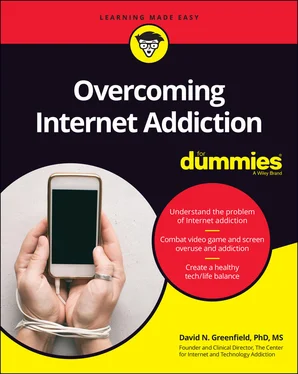Recognizing Lack of Experience as a Contributing Factor to Addiction
 Addiction initially thrives on inexperience. Through experience, people acquire the skills to maintain balance between purely pleasurable activities and unpleasant activities (delays of gratification) that may be helpful for future success. They learn through the consequences of excess and through negative consequences that result from lost time and life imbalance. Addiction, in a sense, is a form of incomplete learning, as you’re only experiencing the pleasure and often ignoring the negative consequences of your actions and behaviors. Through mindful moderation, experience, and conscious thought (which requires an unintoxicated brain), you can learn about your addiction and how to change it; it’s also important for healthy development that children and adolescents experience the world and its natural consequences and real-time rewards.
Addiction initially thrives on inexperience. Through experience, people acquire the skills to maintain balance between purely pleasurable activities and unpleasant activities (delays of gratification) that may be helpful for future success. They learn through the consequences of excess and through negative consequences that result from lost time and life imbalance. Addiction, in a sense, is a form of incomplete learning, as you’re only experiencing the pleasure and often ignoring the negative consequences of your actions and behaviors. Through mindful moderation, experience, and conscious thought (which requires an unintoxicated brain), you can learn about your addiction and how to change it; it’s also important for healthy development that children and adolescents experience the world and its natural consequences and real-time rewards.
Watching out for overprotection
Out of love and concern for your kids, you may think that it’s a good idea to protect them from all of life’s ups and downs. This is certainly understandable, but is it always best for your child? It seems that parenting has become safety-focused, often to the point of overprotecting children and robbing them of the opportunity to experience mistakes and their consequences. While, of course, you don’t want anything dangerous or damaging to happen to your children, there is a point where such protectiveness does more damage than good and potentially blocks them from learning how to manage the ebbs and flows of life. This can also limit your child’s willingness and ability to take the necessary risks required to reach maturity and launch into adulthood.
Through their experiences, children encounter limits, consequences, emotions, socialization, compromise, and how to manage their minds and bodies. They come head-to-head with their fears and develop the resilience and courage they need to face challenges. As children learn, they begin establishing a balance between the strong limbic (dopaminergic) desires for pleasure, and the gabaminergic inhibition of the cerebral cortex and frontal lobes (all covered earlier in this chapter). As their brains’ executive functions strengthen and become better equipped to counteract desire for excess pleasure, children can engage in more rational internal discourse, such as “Yes, that would be a lot of fun, but no, I’m not going to stay up all night gaming because I have an exam to study for and I have to be up early.” Or they will become able to bargain with themselves with a delayed reward after accomplishing a necessary (but less pleasurable) task.
Thwarting normal development
 Internet addiction (and all addictions, for that matter) is a form of escapism, which thwarts the ability to learn in healthy ways. Addictions temporarily thwart the opportunity for real-life experiences and to learn from the natural consequences (positive, negative, and neutral) of various choices and behaviors, and overindulgence in anything that separates a person from balanced real-time living can hamper personal growth and development. It’s important to note that the Internet and screens themselves are not the issue here; it’s the powerful, mood-altering, and addictive pleasure that can skew healthy choices.
Internet addiction (and all addictions, for that matter) is a form of escapism, which thwarts the ability to learn in healthy ways. Addictions temporarily thwart the opportunity for real-life experiences and to learn from the natural consequences (positive, negative, and neutral) of various choices and behaviors, and overindulgence in anything that separates a person from balanced real-time living can hamper personal growth and development. It’s important to note that the Internet and screens themselves are not the issue here; it’s the powerful, mood-altering, and addictive pleasure that can skew healthy choices.
Most addictions tend to thwart normal development. Addiction has a way of sidetracking typical developmental milestones, especially around social, occupational, and academic pursuits. In the clinic where I work, it’s not uncommon to see patients who seem several years their junior with regard to developmental milestones and tasks, relative to their chronological age. They will have delays in normal things such as getting a driver’s license, dating, applying to college, or getting a job. One of the interesting changes I’ve seen from heavy Internet and screen use is the delay or avoidance of getting a driver’s license; one of the theories for this (which is more common than you might think) is there is less desire to go anywhere because everywhere comes to them online! Please keep in mind that even if such delays occur, it does not mean they won’t be able to get back on track, as many of our patients do — most addictions throw people off their normal developmental line, but many can and do get back on track.
At the residential and outpatient treatment centers where I work, I see the same scenario repeatedly: The patients do not, or cannot, master the challenges of growing up and becoming autonomous, self-regulating adults — in short, they have trouble launching into adulthood. Internet screen use can block the adolescent or young adult from mastering basic life skills; it creates developmental and neurobiological detours that impede growing up and limits their ability to experience the pleasures and responsibilities of adulting.
Addiction and delayed development create a vicious cycle. Impairment in frontal lobe activation impairs a person’s ability to perceive the risks or consequences of an addictive behavior, which, in turn, reduces their inhibitions to continue to engage in the addictive behavior. The person can then develop a heightened perception of invulnerability and a reduced appreciation for the consequences of their addictive behavior. This lack of appreciation of their behavior, and subsequent consequences, contribute further to the addiction cycle. This is an example of how denial and a lack of objectivity are a significant part of addiction.
 Please recognize that much of this process is unconscious and largely neurobiological, and that often, normal stages of development, life stressors, trauma, and other medical or psychiatric issues can contribute to the potential for addiction. Many parents and loved ones assume that their child’s excessive or addictive use of technology is volitional when, in fact, it is not; although it may start as such, it can quickly degrade into a deeply addictive pattern of behavior with little self-awareness, often accompanied by denial. Parents often adhere to the belief that video games and screen use are under the conscious control of their child when nothing could be further from the truth. Their anger at their kids can be amplified by an erroneous assumption that their children should be able to control their screen use, when in many cases they can’t. This process can devolve into frequent struggles over technology, including fighting, hiding modems and devices, and inconsistent attempts to limit a child’s screen use. These techniques typically fail as there needs to be a more organized and consistent treatment plan in place to effect lasting change.
Please recognize that much of this process is unconscious and largely neurobiological, and that often, normal stages of development, life stressors, trauma, and other medical or psychiatric issues can contribute to the potential for addiction. Many parents and loved ones assume that their child’s excessive or addictive use of technology is volitional when, in fact, it is not; although it may start as such, it can quickly degrade into a deeply addictive pattern of behavior with little self-awareness, often accompanied by denial. Parents often adhere to the belief that video games and screen use are under the conscious control of their child when nothing could be further from the truth. Their anger at their kids can be amplified by an erroneous assumption that their children should be able to control their screen use, when in many cases they can’t. This process can devolve into frequent struggles over technology, including fighting, hiding modems and devices, and inconsistent attempts to limit a child’s screen use. These techniques typically fail as there needs to be a more organized and consistent treatment plan in place to effect lasting change.
THE MYTH OF THE INTERNET AS A POSITIVE TOOL FOR ACADEMICS AND PRODUCTIVITY
One challenge in the battle against Internet and screen addiction is that the Internet is often promoted as a tool for improving productivity and academic performance in school, but this is not actually the case. The reality is that most of the time children and adolescents spend on their devices is not necessarily productive nor academic. Furthermore, the relationship between academic performance and screen use is far from conclusive. Increased distractibility, time distortion, reduced attention span, boredom intolerance, and a variety of cognitive and psychological changes seem to be related to higher levels of Internet screen use. Additionally, on average, school-age and college-age kids typically use their screens many hours per day, with only a small percentage of that time devoted to academic pursuits.
Читать дальше

 Addiction initially thrives on inexperience. Through experience, people acquire the skills to maintain balance between purely pleasurable activities and unpleasant activities (delays of gratification) that may be helpful for future success. They learn through the consequences of excess and through negative consequences that result from lost time and life imbalance. Addiction, in a sense, is a form of incomplete learning, as you’re only experiencing the pleasure and often ignoring the negative consequences of your actions and behaviors. Through mindful moderation, experience, and conscious thought (which requires an unintoxicated brain), you can learn about your addiction and how to change it; it’s also important for healthy development that children and adolescents experience the world and its natural consequences and real-time rewards.
Addiction initially thrives on inexperience. Through experience, people acquire the skills to maintain balance between purely pleasurable activities and unpleasant activities (delays of gratification) that may be helpful for future success. They learn through the consequences of excess and through negative consequences that result from lost time and life imbalance. Addiction, in a sense, is a form of incomplete learning, as you’re only experiencing the pleasure and often ignoring the negative consequences of your actions and behaviors. Through mindful moderation, experience, and conscious thought (which requires an unintoxicated brain), you can learn about your addiction and how to change it; it’s also important for healthy development that children and adolescents experience the world and its natural consequences and real-time rewards. Internet addiction (and all addictions, for that matter) is a form of escapism, which thwarts the ability to learn in healthy ways. Addictions temporarily thwart the opportunity for real-life experiences and to learn from the natural consequences (positive, negative, and neutral) of various choices and behaviors, and overindulgence in anything that separates a person from balanced real-time living can hamper personal growth and development. It’s important to note that the Internet and screens themselves are not the issue here; it’s the powerful, mood-altering, and addictive pleasure that can skew healthy choices.
Internet addiction (and all addictions, for that matter) is a form of escapism, which thwarts the ability to learn in healthy ways. Addictions temporarily thwart the opportunity for real-life experiences and to learn from the natural consequences (positive, negative, and neutral) of various choices and behaviors, and overindulgence in anything that separates a person from balanced real-time living can hamper personal growth and development. It’s important to note that the Internet and screens themselves are not the issue here; it’s the powerful, mood-altering, and addictive pleasure that can skew healthy choices.










